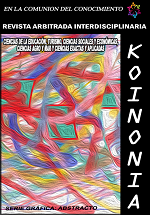Meaningful learning from the constructivist educational praxis
DOI:
https://doi.org/10.35381/r.k.v7i13.1643Keywords:
Education, mathematics, pedagogical practice. (UNESCO Thesaurus).Abstract
The purpose of this research was to generate theoretical principles for a constructivist educational praxis as a generator of meaningful learning of mathematics in elementary school students. The methodology, framed in the interpretative paradigm and with a qualitative approach, was carried out through the application of the phenomenological method. The key informants were seven 5th grade mathematics teachers and fourteen of their students. The in-depth interview technique was used to collect the information based on a script of questions. The interviews were transcribed, codified, categorized and triangulated to respond to the research purpose. As a result, a conceptualization of the theoretical principles for a constructivist educational praxis that generates meaningful learning in the area of mathematics was obtained. It is considered that the teacher's reflection is the starting point to advance towards an effective constructivist educational praxis for the teaching of mathematics.
Downloads
References
Ausubel, D.; Novak, J. y Hanesian, H. (2000). Psicología educativa. Un punto de vista cognoscitivo [Educational psychology. A cognitive point of view]. México: Trillas.
Broitman, C., Escobar, M., Ponce, H., y Sancha, I. (2017). Enseñar a estudiar matemáticas en la escuela primaria. [Teaching mathematics in primary school]. Primera edición. Ciudad Autónoma de Buenos Aires: Santillana,
Coll, C. y Martin, J. (1997). Un Marco Referencial Psicológico para la Educación Escolar. La Concepción Constructivista del Aprendizaje y de la Enseñanza. [A Psychological Reference Framework for School Education. The Constructivist Conception of Learning and Teaching]. Madrid. Alianza.
Díaz, F. y Hernández, G. (2003). Estrategias Docentes para un Aprendizaje Significativo. Una Interpretación Constructivista. [Teaching Strategies for Meaningful Learning. A Constructivist Interpretation]. México. Mc. Graw-Hill
Díaz, F. y Hernández, G. (2010). Estrategias docentes para un aprendizaje significativo. [Teaching strategies for meaningful learning]. Tercera edición. México: McGraw-Hill Interamericana
Instituto Colombiano para la evaluación de la educación. (ICFES, 2017). Informe nacional resultados nacionales 2009, 2012-2017, Saber 3°, 5° y 9° 2017 [National report national results 2009, 2012-2017, Saber 3°, 5° and 9° 2017]. Bogotá. Colombia
López, J. (2017). Constructivismo como plataforma epistémica en didáctica alternativa en resolución de problemas matemáticos [Constructivism as an epistemic platform in alternative didactics in solving mathematical problems]. Tesis Doctoral. Universidad de Carabobo. Venezuela.
Martínez, M. (2001). Comportamiento humano. Nuevos métodos de investigación [Human behavior. New research methods]. 2ª Edición. México: Editorial Trillas.
Miranda-Núñez, Y. (2020). Praxis educativa constructivista como generadora de Aprendizaje Significativo en el área de Matemática. [Constructivist educational praxis as a generator of Meaningful Learning in the area of Mathematics] CIENCIAMATRIA, Revista Interdisciplinaria de Humanidades, Educación, Ciencia y Tecnología, 6(1). Edición Especial. DOI 10.35381/cm.v6i1.299
Organización para la Cooperación y el Desarrollo Económicos. (OECD, 2019). Programa para la Evaluación Internacional de Alumnos (PISA). [Programme for International Student Assessment (PISA)] Disponible en https://n9.cl/wt4wi
Pozo, J. (1996). Aprendices y maestros [Apprentices and masters]. Madrid: Alianza.
Yuni, J., Urbano, C. (2005). Investigación Etnográfica. Investigación-Acción. Mapas y Herramientas para conocer la Escuela [Ethnographic Research. Action. Maps and Tools to get to know the Schoo]. Córdoba: Brujas.
Zamorano. (2015) La práctica de la enseñanza de las matemáticas a través de las situaciones de contingencia [The practice of teaching mathematics through contingency situations]. Tesis doctoral. Universidad Autónoma de Barcelona
Published
How to Cite
Issue
Section
License
CC BY-NC-SA : Esta licencia permite a los reutilizadores distribuir, remezclar, adaptar y construir sobre el material en cualquier medio o formato solo con fines no comerciales, y solo siempre y cuando se dé la atribución al creador. Si remezcla, adapta o construye sobre el material, debe licenciar el material modificado bajo términos idénticos.
OAI-PMH URL: https://fundacionkoinonia.com.ve/ojs/index.php/revistakoinonia/oai.









